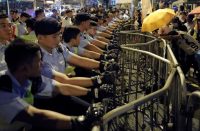
I Know What a Meaningful Election in Hong Kong Is. This Isn’t One
The signs and messages are everywhere: “Cast a vote for Hong Kong and yourself”. Candidates’ faces cover the pavement and walls from the city center to stalls in the wet markets on its outskirts. Government-sponsored billboards calling to “improve electoral system, ensure patriots administering Hong Kong” abound.
Hong Kong and Chinese government officials have for weeks been urging the public to vote in this weekend’s legislative election. But this is not a typical free and fair election: It’s a selection process, thanks to an electoral overhaul with no meaningful participation from the opposition (not least because many are in jail).
The Chinese government wants this election to appear to be successful, as Beijing needs the facade of Hong Kong becoming more “democratic”.… Seguir leyendo »







